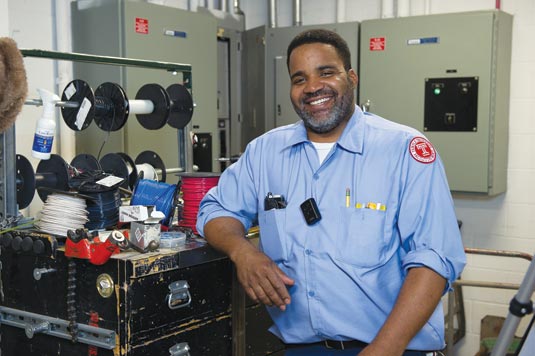After-work medical screening could save your life

Temple University Hospital electrician James Nixon had no fear of being screened for colorectal cancer. In fact, he wishes he had been tested earlier.
“My wife had a colonoscopy and they found a couple of polyps that had to be removed,” said Nixon. “That made me decide that I should be screened too.”
During his colonoscopy, Nixon says that Temple physicians found four small polyps. None of them were cancerous, but all were removed.
“It made me feel good that I got checked because they told me colon cancer takes years to grow,” said Nixon. “Imagine if I had waited and those polyps would have grown even more.”
To help make colorectal screenings more convenient for Temple employees and their family members, the Temple Digestive Disease Center is offering “after-work” screening appointments between the hours of 4:30-6:30 p.m. throughout the month of March.
At the appointments, Temple GI specialists will evaluate risk for colorectal cancer and recommend appropriate screening tests. Everyone age 50 or older should be screened. Appointments can be made by calling Family First at 215-707-5300.
“We’re offering these appointments to Temple employees and their family members because we want to provide them with a convenient opportunity to get tested,” said Dr. Benjamin Krevsky, director of Gastrointestinal Endoscopy and associate chief of Gastroenterology at Temple University Hospital. “This is truly a screening that could save your life.”
According to Krevsky, colorectal cancer is the second leading cancer killer in the United States. It is also one of the most preventable and is often successfully treated if caught early.
“Colon cancer starts in the large intestine (colon) or the rectum (end of the colon),” he said. “Nearly all colon cancers begin as noncancerous polyps, which slowly develop into cancer. That is why it is so important to catch polyps early through screenings.”
Krevsky recommends that anyone over the age of 50 be screened every five to 10 years depending on whether there is a history of colon cancer in the family.
Busy Temple employees are taking advantage of the Temple Digestive Disease Center’s convenient appointments and urging their family members and friends to do the same.
Katherine Levins, director of Government Affairs for the Temple University Health System, says getting screened for colorectal cancer was a “no-brainer.”
“I eat right and exercise, but I knew getting screened was the right thing to do for me and my family,” said Levins. “My entire experience at Temple was very positive, and I was made to feel comfortable throughout the procedure. Everyone took the time to answer my questions and was very friendly and helpful.
“Honestly, it was the easiest thing I did all year.”
James Nixon agrees. “People shouldn’t be afraid to get screened,” he said, “because one day it could save your life.”